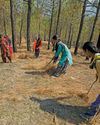
THE NOVEL coronavirus or sars-cov-2, that caused the covid-19 pandemic, continues to wreak havoc across countries even five years after it first struck the world. It remains a pandemic even though the World Health Organization (who) in May 2023 declared an end to covid-19 as a public health emergency. So far, the virus has infected 700 million people and killed 7 million (more than half-a-million have died in India alone); in September, over 80,000 covid-19 cases were reported every week from across the globe.
While the world appears to have reconciled to the idea of living with the virus, the spectre of another pandemic with a deadlier leash looms large. who has released a list of 30 viral and bacterial families, which can potentially cause epidemics and pandemics in the future. The world is shifting to a global regime of preparedness and effective responses to any such future pandemics or health emergencies. This May, countries at the 77th World Health Assembly (wha) agreed to the “Pandemic Prevention, Preparedness, and Response Accord”, also called the Pandemic Treaty. It may be adopted at the next wha, which would take place in 2025.
In September, India took a step towards preparing for the future pandemics or public health emergencies of high magnitude, as an expert group set up by the government think-tank niti Aayog released the “Future Pandemic Preparedness and Emergency Response—a Framework for Action”. The terms of reference for the expert group were to “draw lessons and experiences, both national and global, on how covid was managed and visualise preparedness elements and future pathways for fighting any infectious public health crisis”.
This story is from the {{IssueName}} edition of {{MagazineName}}.
Start your 7-day Magzter GOLD free trial to access thousands of curated premium stories, and 9,000+ magazines and newspapers.
Already a subscriber ? Sign In
This story is from the {{IssueName}} edition of {{MagazineName}}.
Start your 7-day Magzter GOLD free trial to access thousands of curated premium stories, and 9,000+ magazines and newspapers.
Already a subscriber? Sign In

THE CIRCULARITY ARGUMENT
A circular economy can help India achieve its developmental aspirations while following the low-carbon pathway. It will also help address the challenges of waste management, pollution and overexploitation of natural resources. Industries are already innovating to reuse high-volume wastes and have shown that the transition can usher in both environmental and financial windfalls

Banking on flawed drug voluntary licences
The Medicines Patent Pool is pushing for more VLs, but its bad deal with Novartis on a cancer drug shows the pitfalls

Lasting solutions
For the first time, the UN has recognised the role of indigenous communities in tackling aridity. A repository of traditional knowledge India has the wherewithal to lead the way

IMD at 150
India's journey into modern weather forecasting took a decisive turn 150 years ago with the establishment of India Meteorological Department during the British rule. The agency has come a long way since then, shaping the way the country predicts and responds to its diverse climate challenges

Every drop counts
In drought-prone Marathwada region, 14 villages have managed to counter water shortage by budgeting the resource

Threat to survival
Hollongapar Gibbon Sanctuary in Assam faces ecological challenges as railway electrification and hydrocarbon exploration endanger its fragile biodiversity

'Migration is going to be a battlefield'
AMITAV GHOSH is one of the foremost chroniclers of our times. His literary sojourn includes writings on topics that range from languages to climate change to human lives. His latest book, Wild Fictions, brings some of his works on these issues under one title. In a conversation with RAJAT GHAI, Ghosh shares his views on the future of human movement. Excerpts:

Face of future
California wildfires confirm forest fires are intensifying in a hotter world, emitting substantial amounts of greenhouse gases and reinforcing global warming

Friends of the forest
Residents of 30 villages in Uttarakhand establish a model for public participation in saving forests from wildfires

Climate-crazy playbook
Just hours after his second (and final) term began on January 20, US President Donald Trump unleashed 46 presidential actions. Several of these are centred on the US' climate commitments, energy transition, migration and trade policies, and are likely to have negative global implications